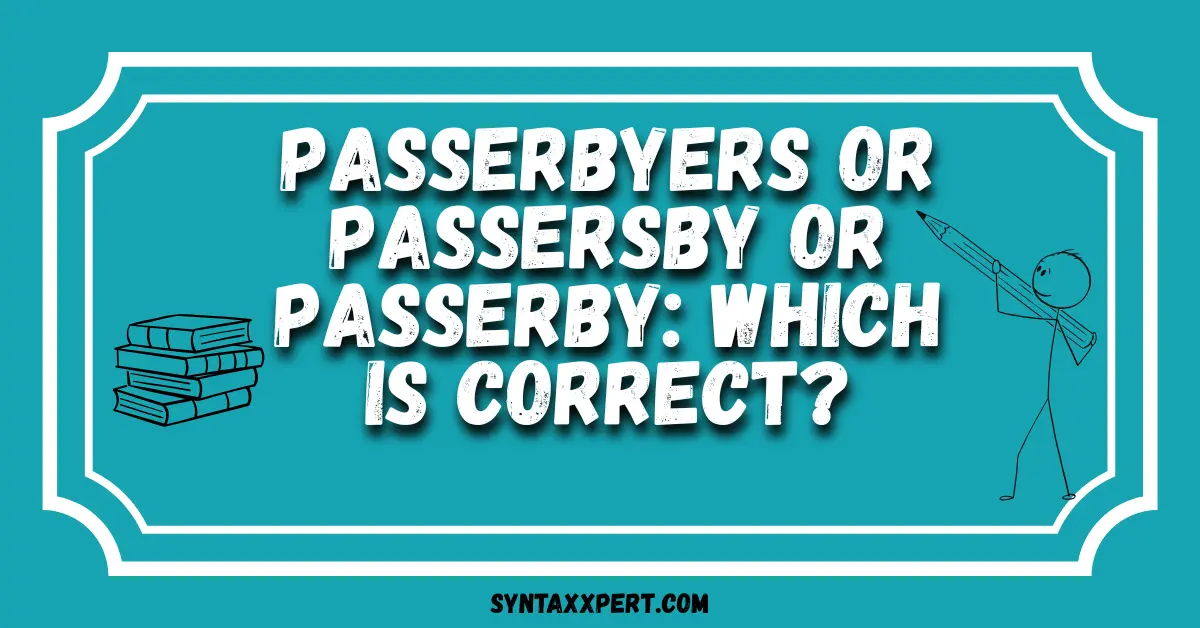English can be tricky sometimes. Words like passerbyers or passersby or passerby confuse even fluent speakers. You might have seen “passerbyers” online and thought it sounded right—but is it? The truth is, only passersby is grammatically correct.
Understanding why this is the case means diving a little deeper into English pluralization, compound nouns, and language history. So, let’s unpack it—step by step.
What Does “Passerby” Mean?
A passerby is someone who passes by, often on foot, and isn’t directly part of the scene. Imagine walking past a street performer, a market, or even an accident—you’d be the passerby.
“A passerby helped the lost child find her parents.”
Basic facts about ‘passerby’
- Part of speech: Noun (countable)
- Pronunciation: /ˈpæsərˌbaɪ/
- Meaning: A person passing by a particular spot
- Usage: Common in journalism, fiction, and everyday conversation
The term originated in Middle English, formed from the verb pass and the preposition by, later turning into a compound noun — passerby.
The Correct Plural Form Is “Passersby”
The correct plural of passerby is passersby, not passerbyers or passerbys. Why? Because passerby is a compound noun, and English pluralizes such words internally — meaning, the main noun (passer) takes the plural form, not the modifier (by).
So:
passerby → passersby
| Form | Correctness | Example |
| passerby | ✅ Singular | “A passerby waved at the crowd.” |
| passersby | ✅ Plural | “Several passersby stopped to help.” |
| passerbyers | ❌ Incorrect | “A few passerbyers came by.” |
| passerbys | ❌ Incorrect | “Many passerbys watched the show.” |
This is similar to other English compound nouns, such as:
- mother-in-law → mothers-in-law
- attorney general → attorneys general
- court-martial → courts-martial
The logic is the same: pluralize the main noun.
Why “Passerbyers” Sounds Right (But Isn’t)
“Passerbyers” is one of those fake words that feels plausible because it follows a familiar pattern. English often adds -ers to make nouns describing people — baker, teacher, singer.
So, you might think:
pass + by + er → passerby plural → passerbyers
But that’s where English grammar says “no.”
The problem is that passer already contains the -er suffix, meaning “one who passes.” Adding another -ers would be like saying “ones who one who passes.”
Linguistically, that’s redundant and nonsensical.
“Passerbyers” is not recognized in any major English dictionary, including Merriam-Webster, Oxford English Dictionary, and Cambridge Dictionary.
In fact, Grammarly’s own NLP model flags it as a spelling error, categorizing it as a non-word.
Common Mistake: “Passerbys” vs “Passersby”
Let’s face it—passerbys looks reasonable. You just add an “s,” right? That’s the rule for most English nouns… except compound ones.
Think of passerby as “a passer (person) who goes by.” Since “passer” is the actual noun, it’s the part that gets pluralized:
one passerby → two passersby
Here’s how they look side by side:
| Incorrect | Correct | Reason |
| passerbys | passersby | pluralize the main noun (passer) |
| mother-in-laws | mothers-in-law | pluralize the main noun (mother) |
| passerbyers | passersby | passer already includes “-er” |
Quick tip: Imagine “passersby” as “people passing by.” That visual helps you remember which part takes the plural.
Grammar Rule Explained: Compound Noun Pluralization
This topic taps into one of the most interesting grammar rules: compound nouns—words made up of two or more parts that function as a single noun.
Examples include:
- mother-in-law
- attorney general
- passerby
- bystander
- lookout
When pluralizing such nouns:
- Pluralize the main noun (the meaningful part).
- Leave the preposition or modifier as it is.
So:
- passerby → passersby
- mother-in-law → mothers-in-law
- commander-in-chief → commanders-in-chief
These are called internally pluralized nouns—and they often confuse learners because English doesn’t apply this rule everywhere, only to specific compounds.
“English loves exceptions, and ‘passersby’ is one of its favorite ones.”
“Passer-by” or “Passerby”: Hyphen Confusion
Is it “passer-by” or “passerby”? Both exist—but not equally. Historically, the hyphenated version (passer-by) was standard in British English. Modern English, especially in American contexts, prefers the single word (passerby).
| Variant | Region | Status |
| passer-by | British English | Older / traditional |
| passerby | American English | Modern / standard |
According to the Oxford English Dictionary, passer-by remains acceptable, while Merriam-Webster lists only passerby as standard.
So, if you’re writing for a global audience, go with passerby (no hyphen)—it’s recognized universally.
Real-Life Usage: How “Passersby” Appears in Context
To understand natural usage, let’s look at a few examples from everyday contexts:
- News reports: “Two passersby reported the incident to police.”
- Fiction: “Passersby paused to admire the street musician.”
- Conversations: “A passerby pointed us in the right direction.”
Case Study: Google Ngram Analysis
A search of passersby vs passerbys on Google Ngram (which tracks word frequency in published books) shows passersby dominates overwhelmingly. In published English, passerbys barely appears—often only as misspellings.
Synonyms of “Passerby” (and Subtle Differences)
While passerby is the correct term, English offers alternatives depending on tone or context.
| Word | Meaning | Subtle Difference |
| Bystander | Someone present but not involved | Implies witness or observer |
| Pedestrian | Someone walking on a road | More formal and technical |
| Onlooker | Someone watching something | Often implies curiosity |
| Spectator | Someone watching an event | Usually organized (e.g., sports) |
Example:
“Several passersby and bystanders gathered at the scene.”
Etymology: How the Word Evolved
The word passerby first appeared in English in the late 1500s, meaning “one who goes past.” It came from pass (verb) + by (preposition) → pass by → passer-by → passerby.
This pattern of compound-to-hyphen-to-single-word evolution is common:
- to-day → today
- any one → anyone
- some one → someone
So, passerby followed a natural linguistic progression, simplifying over time.
Pronunciation and Grammar Insights
Pronunciation:
- Passerby → /ˈpæsərˌbaɪ/
- Passersby → /ˈpæsərzˌbaɪ/
Part of Speech: Noun — countable, meaning a person or people who happen to pass by.
Plural Possessive:
- Singular possessive → passerby’s
- Plural possessive → passersby’s
“A passerby’s jacket was found.” “The passersby’s reactions were mixed.”
Common English Plural Mistakes (and Why They Happen)
English pluralization breaks its own rules—often. Learners expect uniformity, but the language loves exceptions. Let’s look at similar confusions:
| Incorrect | Correct | Explanation |
| passerbyers | passersby | pluralize main noun |
| passerbys | passersby | internal pluralization |
| brother-in-laws | brothers-in-law | pluralize “mother” not “law” |
| attorney generals | attorneys general | pluralize “attorney” |
| son-in-laws | sons-in-law | pluralize “son” |
Why it matters: Compound nouns carry meaning through the first element. Pluralizing the second part would distort the structure.
READ MORE >>> Gasses or Gases — Which Is Correct and What’s the Difference?
Quick Grammar Reference Table
| Form | Number | Correctness | Usage Example |
| passerby | Singular | ✅ | “A passerby smiled politely.” |
| passersby | Plural | ✅ | “Several passersby clapped.” |
| passerby’s | Singular possessive | ✅ | “A passerby’s hat blew away.” |
| passersby’s | Plural possessive | ✅ | “The passersby’s reactions varied.” |
| passerbyers | Plural (incorrect) | ❌ | “Passerbyers waved.” |
| passerbys | Plural (incorrect) | ❌ | “Many passerbys gathered.” |
FAQs
Is “passerbyers” a real word?
No, it’s incorrect. It’s a misspelling of passersby.
What is the plural of “passerby”?
The plural is passersby.
Can I say “passerbys”?
No. It’s grammatically wrong. Use passersby.
Is “passer-by” still acceptable?
Yes, mainly in British English or older literature.
What’s the difference between “passerby” and “bystander”?
A passerby walks past; a bystander stays nearby and observes.
Final Thoughts
To wrap it all up:
✅ Singular → passerby ✅ Plural → passersby ❌ Incorrect → passerbyers, passerbys
Understanding this small rule opens the door to mastering dozens of other tricky compound plurals in English.
When in doubt, look for the main noun in the compound—that’s the one to pluralize. Language evolves, but this rule has stood strong for centuries.
Remember:
“Grammar isn’t about memorizing rules; it’s about seeing patterns. Once you understand why ‘passersby’ works, you’ll never forget it.”

I’m Luna Hazel, a grammar expert here to help you master the art of clear, confident writing. Let’s make every word count!

